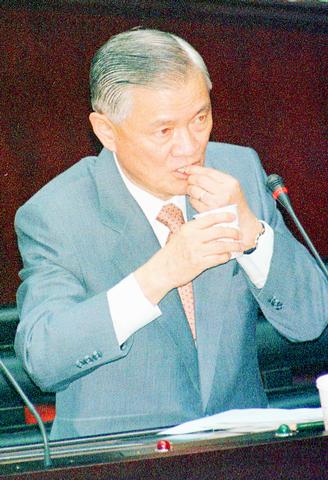Premier Tang Fei (
"The Fourth Nuclear Power Plant's reactors are reasonably safe ? We should therefore continue the project, identify appropriate supportive measures at the same time and suspend operation of the first and second plants, which are less safe," Tang said, adding that alternatives mooted by the Ministry of Economic Affairs were not without flaws.
Meanwhile, an official from the Presidential Office said that President Chen Shui-bian (

PHOTO: LEE HONG-MING, TAIPEI TIMES
"Though the president's opinion differs from that of Tang on the Fourth Nuclear Power Plant," said acting secretary-general of the Presidential Office Chen Che-nan (
Chen Che-nan stressed that the president would support the Cabinet without reservation, but refused to confirm whether he discussed the issue with Tang last week.
Although Tang has previously said that the Cabinet would come up with a final decision by the end of October, he has repeatedly expressed his personal preference for continuing the project. He further argued yesterday that carbon dioxide generated by the use of natural gas would accelerate the build-up of greenhouse gases, which, in his view, "was no less harmful than nuclear power."
Tang added that "nuclear power may not be an absolutely safe option, but it poses less risk."
The DPP's legislative caucus was quick to condemn him.
"If Tang decides to continue the project, he will simply have to step down," legislator and veteran anti-unclear activist Lai Chin-lin (
Party caucus convener Hsu Tien-tsai (
"The DPP will adopt every means at its disposal including urging the Presidential Office, party headquarters, the legislative caucus and the Cabinet to prevent Tang's announcement," Hsu added.
"The ultimate goal for the ruling party is to stop the project, keep Tang in his post and talk him into dropping the idea of continuing the plant's construction," said Legislator David Chou (
Chen Che-nan, however, also asked reporters at yesterday's press conference not to continually discuss the question of whether Tang would quit, saying that the president still regarded him as the best choice to lead the Cabinet.
"The president communicates well with the premier," the Presidential Office spokesman said, "and it is neither fair nor polite to continually question Tang's position."
New Party Legislator Lai Shyh-bao (賴士葆) accused the president and premier of adopting a "good cop, bad cop" strategy and predicted that the new government would ultimately proceed with the plant's construction.
"President Chen plays the `good cop' by maintaining his anti-nuclear stance to satisfy his supporters," Lai said. "Premier Tang, as a KMT member who is unlikely to seek election for office in the future, takes the part of `bad cop.'"

INVESTIGATION: The case is the latest instance of a DPP figure being implicated in an espionage network accused of allegedly leaking information to Chinese intelligence Democratic Progressive Party (DPP) member Ho Jen-chieh (何仁傑) was detained and held incommunicado yesterday on suspicion of spying for China during his tenure as assistant to then-minister of foreign affairs Joseph Wu (吳釗燮). The Taipei District Prosecutors’ Office said Ho was implicated during its investigation into alleged spying activities by former Presidential Office consultant Wu Shang-yu (吳尚雨). Prosecutors said there is reason to believe Ho breached the National Security Act (國家安全法) by leaking classified Ministry of Foreign Affairs information to Chinese intelligence. Following interrogation, prosecutors petitioned the Taipei District Court to detain Ho, citing concerns over potential collusion or tampering of evidence. The

NEGOTIATIONS: Taiwan has good relations with Washington and the outlook for the negotiations looks promising, Minister of Economic Affairs J.W. Kuo said Taiwan’s GDP growth this year is expected to decrease by 0.43 to 1.61 percentage points due to the effects of US tariffs, National Development Council (NDC) Minister Paul Liu (劉鏡清) said at a meeting of the legislature’s Economics Committee in Taipei yesterday, citing a preliminary estimate by a private research institution. Taiwan’s economy would be significantly affected by the 32 percent “reciprocal” tariffs slapped by the US, which took effect yesterday, Liu said, adding that GDP growth could fall below 3 percent and potentially even dip below 2 percent to 1.53 percent this year. The council has commissioned another institution

NEGOTIATIONS: The US response to the countermeasures and plans Taiwan presented has been positive, including boosting procurement and investment, the president said Taiwan is included in the first group for trade negotiations with the US, President William Lai (賴清德) said yesterday, as he seeks to shield Taiwanese exporters from a 32 percent tariff. In Washington, US Trade Representative Jamieson Greer said in an interview on Fox News on Thursday that he would speak to his Taiwanese and Israeli counterparts yesterday about tariffs after holding a long discussion with the Vietnamese earlier. US President Donald Trump on Wednesday postponed punishing levies on multiple trade partners, including Taiwan, for three months after trillions of US dollars were wiped off global markets. He has maintained a 10 percent

TRADE: The premier pledged safeguards on ‘Made in Taiwan’ labeling, anti-dumping measures and stricter export controls to strengthen its position in trade talks Products labeled “made in Taiwan” must be genuinely made in Taiwan, Premier Cho Jung-tai (卓榮泰) said yesterday, vowing to enforce strict safeguards against “origin laundering” and initiate anti-dumping investigations to prevent China dumping its products in Taiwan. Cho made the remarks in a discussion session with representatives from industries in Kaohsiung. In response to the US government’s recent announcement of “reciprocal” tariffs on its trading partners, President William Lai (賴清德) and Cho last week began a series of consultations with industry leaders nationwide to gather feedback and address concerns. Taiwanese and US officials held a videoconference on Friday evening to discuss the